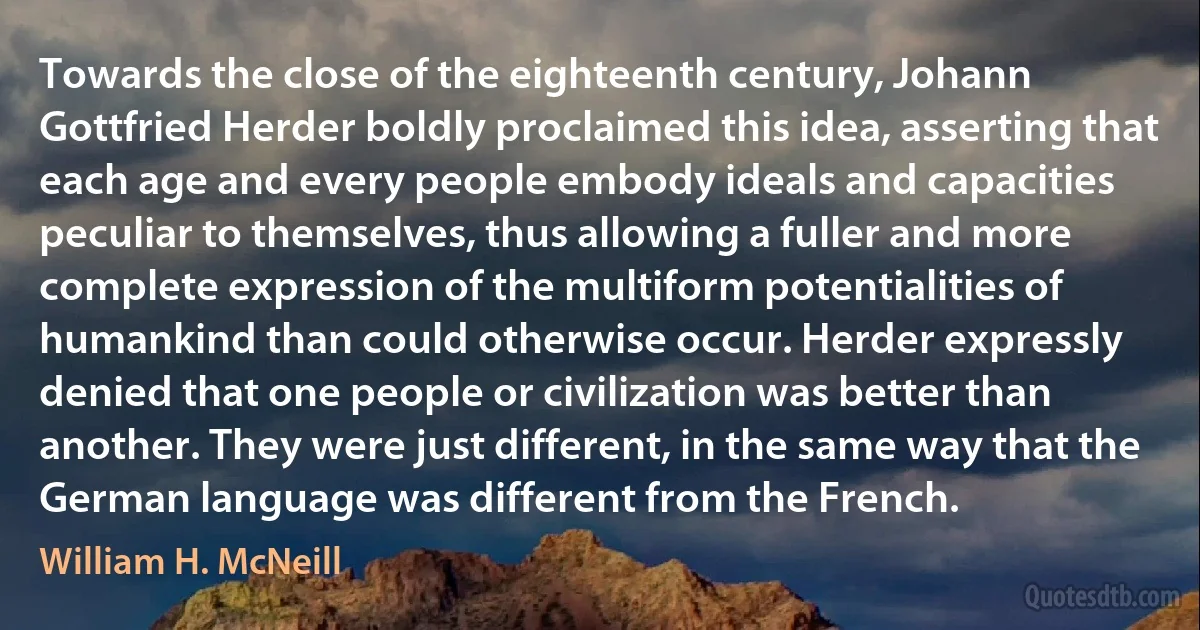Language Quotes - page 99
According to mead, the primary phenomenon out of which language in the full human sense emerges is the gesture, especially the vocal gesture. The gesture sign (such as a dog's snarl) differs from such a nongestural sign as thunder in the fact that the sign vehicle is an early phase of a social act and the designatum a later phase of this act (in this case the attack by the dog). Here one organism prepares itself for what another organism - the dog - is to do by responding to certain acts of the latter organism as signs; in the case in question the snarl is the sign, the attack is the designatum, the animal being attacked is the interpreter, and the preparatory response of the interpreter is the interpretant.

Charles W. Morris
I departed from parental paths significantly and abruptly one Sunday morning when, sitting in the family pew of the Hyde Park United Church and idly twisting a loose button on the cushion beside me, I said to myself, "I do not believe in God." Some months previously... when our minister fell back on St. Anselm's ontological argument to prove the existence of God, he entirely failed to convince me. Quite the contrary, the argument struck me as an abuse of language. Though I duly submitted to the ritual of confirmation... Horton's unconvincing argument had sown doubt in my mind; and for that reason I can assign, on that morning, listening to his more emotional, hortatory rhetoric... the balance tipped, committing me to a secret, personal rejection of the Christian piety my parents held dear.

William H. McNeill
What of the term 'meaning'? In the preceding discussion the term 'meaning' has been deliberately avoided. In general it is well to avoid this term in discussions of signs; theoretically, it can be dispensed with entirely and should not be incorporated into the language of semiotic. But since the term has had such a notorious history, and since in its consideration certain important implications of the present account can be made clear, the present section is devoted to its discussion.

Charles W. Morris
Semiotic provides a basis for understanding the main forms of human activity and their interrelationship, since all these activities and relations are reflected in the signs which mediate the activities ... In giving such understanding, semiotic promises to fulfil one of the tasks which traditionally has been called philosophical. Philosophy has often sinned in confusing in its own language the various functions which signs perform. But it is an old tradition that philosophy should aim to give insight into the characteristic forms of human activity and to strive for the most general and the most systematic knowledge possible. This tradition appears in a modern form in the identification of philosophy with the theory of signs and the unification of science, that is, with the more general and systematic aspects of pure and descriptive semiotic.

Charles W. Morris
The invasion of psychology by cybernetics is making us realize that the ordinary concepts of psychology must be reformulated in the language of physics if a physical explanation of the ordinary psychological phenomena is to become possible. Some psychological concepts can be re-formulated more or less easily, but others are much more difficult, and the investigator must have a deep insight if the physical reality behind the psychological phenomena is to be perceived.

W. Ross Ashby
Cybernetics is likely to reveal a great number of interesting and suggestive parallelisms between machine and brain and society. And it can provide the common language by which discoveries in one branch can readily be made use of in the others... [There are] two peculiar scientific virtues of cybernetics that are worth explicit mention. One is that it offers a single vocabulary and a single set of concepts suitable for representing the most diverse types of system... The second peculiar virtue of cybernetics is that it offers a method for the scientific treatment of the system in which complexity is outstanding and too important to be ignored. Such systems are, as we well know, only too common in the biological world!

W. Ross Ashby
You know my philosophy is that the world is a big place so if you get the chance to live abroad lessons in life it gives you are like no other. I moved to Cascias when I was one and a half. I do feel very fortunate that I grew up in a Latin culture and learnt another language. When I approach a character or a script I can approach it from different points of view, with maybe a more international perspective.

Annabelle Wallis
That was the other thing that drew me to India-the language. In high school my Latin teacher taught me Greek unofficially on Monday nights. I loved Greek; I loved the idea that there was another script. And then my Latin teacher told me there was a language that was even older and more interesting than Greek: Sanskrit. So everything started coming together-the art, the literature, the language.

Wendy Doniger
If the ideas of a ruling class were once the dominant (or hegemonic) ideology of bourgeois society, the advanced capitalist countries today are now a field of stylistic and discursive heterogeneity without norm. Faceless masters continue to inflect the economic strategies which constrain our existence, but they no longer need to impose their speech (or are henceforth unable to); and the postliteracy of the late capitalist world reflects not only the absence of any great collective project but also the unavailability of the older national language itself.

Fredric Jameson
Mujahid Shah, on this occasion, repaired mosques which had been built by the officers of Alla-ood-Deen Khiljy. He broke down many temples of the idolaters, and laid waste the country; after which he hastened to Beejanuggur... The King drove them before him, and gained the bank of a piece of water, which alone divided him from the citadel, where in the Ray resided. Near this spot was an eminence, on which stood a temple, covered with plates of gold and silver, set with jewels: it was much venerated by the Hindoos, and called, in the language of the country, Puttuk. The King, considering its destruction a religious obligation ascended the hill, and having razed the edifice, became possessed of the precious metals and jewels therein.

Firishta
Theories of the postmodern - whether celebratory or couched in the language of moral revulsion and denunciation - bear a strong family resemblance to all those more ambitious sociological generalizations which, at much the same time, bring us the news of the arrival and inauguration of a whole new type of society, most famously baptized "postindustrial society"(Daniel Bell) but often also designated consumer society, media society, information society, electronic society, or high tech and the like. Such theories have the obvious ideological mission of demonstrating, to their own relief, that the new social formation in question no longer obeys the laws of classical capitalism, namely, the primacy of industrial production and the omnipresence of class struggle.

Fredric Jameson
Algebraic geometry has developed in waves, each with its own language and point of view. The late nineteenth century saw the function-theoretic approach of Riemann, the more geometric approach of Brill and Noether, and the purely algebraic approach of Kronecker, Dedekind, and Weber. The Italian school followed with Castelnuovo, Enriques, and Severi, culminating in the classification of algebraic surfaces. Then came the twentieth-century "American" school of Chow, Weil, and Zariski, which gave firm algebraic foundations to the Italian intuition. Most recently, Serre and Grothendieck initiated the French school, which has rewritten the foundations of algebraic geometry in terms of schemes and cohomology, and which has an impressive record of solving old problems with new techniques. Each of these schools has introduced new concepts and methods.

Robin Hartshorne
Euclid's work will live long after all the text books of the present day are superseded and forgotten. It is one of the noblest monuments of antiquity; no mathematician worthy of the name can afford not to know Euclid, the real Euclid as distinct from any revised or rewritten versions which will serve for schoolboys or engineers. And, to know Euclid, it is necessary to know his language, and, so far as it can be traced, the history of the "elements" which he collected in his immortal work.

Thomas Little Heath
The earlier views, those of Hobbes or Locke for instance, saw language as an instrument, and understood meaning in terms of designation. Discovering the meaning of words is finding what ideas or things they stood for. ... By contrast, a hermeneutical view requires a very different conception. If we are partly constituted by our self-understanding, and this in turn can be very different according to the various languages which articulate for us a background of distinctions of worth, then language does not only serve to depict ourselves and the world, it also helps constitute our lives. Certain ways of being, of feeling, of relating to each other are only possible given certain linguistic resources.

Charles Taylor
In [the story of Jesus] I found ... a center for my being. Behind the supernatural framework of the first century, behind the language of myth, magic, and superstition, I discovered a life I wanted to know; a life that possessed a power I wanted to possess; a freedom, a wholeness for which I had yearned for years.

John Shelby Spong
The God of the Hebrews is a God that human language, we're not even supposed to speak the holy name. We were told in the Second Commandment we could make no images of this God, and I don't think that means just building idols, I think that means also trying to believe you've captured God in your words, in the Creeds, in the Scriptures.

John Shelby Spong



